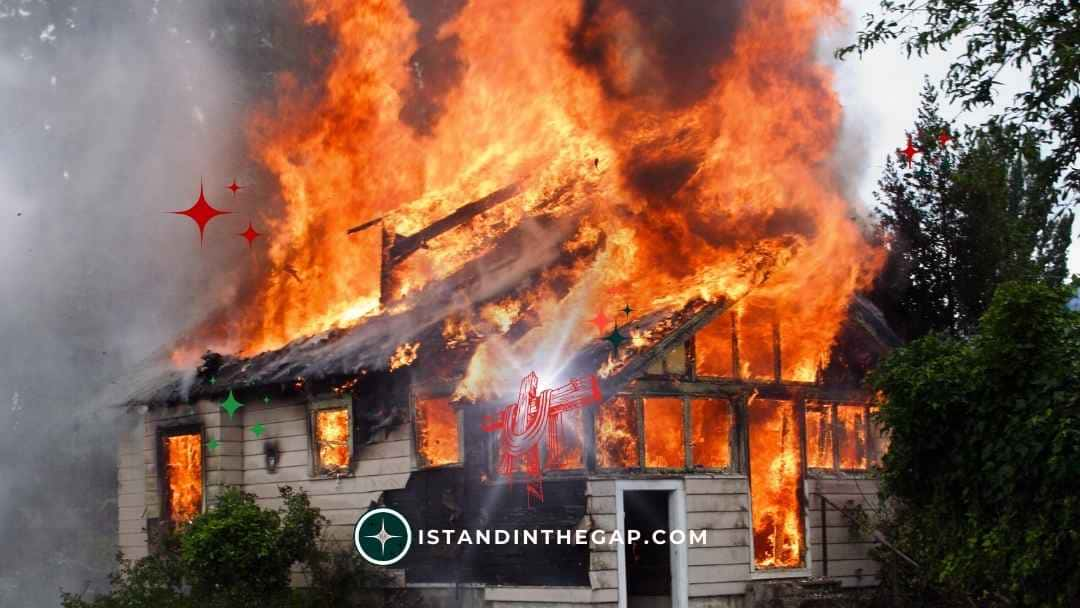In a harrowing instance of Christian persecution, you may find it unsettling to learn about the tragic fate faced by a family in Uganda.
Three Members of Family Burned to Death after Accepting Christ
Following their conversion to Christianity, a couple and their son were brutally murdered, igniting discussions about religious freedom and security in regions with high religious tensions.
As you read their story, consider the implications such acts of violence have on communities striving for faith-based expression amidst adversity.
The Kaiga Family Burned to Death and Their Conversion
Little did the Kaiga family know that their newfound faith in Christ would lead to a tragic end. After their conversion on November 22, 2024, they kept their beliefs secret due to the danger posed by their Muslim community.
The family’s faith was solidified when Swagga was healed from malaria, further deepening their commitment to Christianity despite Kaiga Muhammad’s previous role as a committee member in a local mosque.
Community Reactions to the Conversion
Kaiga Muhammad’s open declaration of his Christian faith enraged the local Muslim community, leading to a severe backlash.
After being informed of the family’s conversion, area chairperson Wangule Abudu threatened Muhammad, insisting he renounce his faith within a week or face mobilization from the community against his family.
The community’s reaction was swift and violent. Following Abudu’s ultimatum, local Muslims were incensed by the news of the Kaiga family’s conversion, feeling that it brought shame upon them.
This prompted the horrifying act of arson that resulted in the family’s deaths.
Their tragic end highlights the ongoing challenges faced by converts to Christianity in regions with significant Muslim populations, illustrating the risks individuals encounter for their faith choices.
Events Leading to the Arson
If you examine the timeline of events, the tragic fate of the Kaiga family began after they embraced Christianity on November 22.
After a church visit that included a prayer for their son suffering from malaria, their newfound faith was thrust into the spotlight when community Muslims learned about Muhammad attending a church service.
Faced with growing hostility, area chairperson Wangule Abudu demanded that the family renounce their faith within a week, threatening to incite the Muslim community against them if they refused.
Eyewitness Accounts
Accounts from neighbors reveal the horror of the night the Kaiga family was attacked. Witnesses reported a devastating scene as the family’s home was engulfed in flames on December 26.
They arrived too late to intervene, with some recalling the frantic cries for help that echoed before the inferno consumed the house and its occupants, leaving no chance of escape for the family.
Another neighbor described the aftermath, stating that upon arrival, they discovered the charred remains of the family, a stark reminder of the violence they faced for their beliefs.
The community’s shock and mourning grew as discussions about the deadly consequences of religious persecution spread.
Those in the area are left reflecting on the protection and understanding that should be afforded to all individuals, regardless of their faith, in their quest for spiritual truth.
Arrests Made by Local Authorities
Assuming the horrifying events raised awareness, local authorities took action after the tragic incident.
Police apprehended two individuals, Wangule Abudu and Ismail Njagi, who were involved in the attack on the family.
They are currently detained at Kaliro central police station, highlighting a commitment to address violence stemming from religious intolerance.
Charges Filed Against Suspects
For the suspects, charges of murder and arson were filed following the brutal killings of the Kaiga family. This significant step reflects the legal response to the community’s outcry for justice and safety.
Authorities have made it clear that the charges stem from the violent act committed on December 26, resulting in the death of 64-year-old Kaiga Muhammad, his wife Sawuya, and their son Swagga Amuza Kaiga.
The brutal assault not only highlights the dangers faced by converts in certain regions of Uganda but also raises questions about the enforcement of religious freedom laws in a nation where Muslims comprise only about 12% of the population.
Trends in Religious Persecution in Uganda
Little is known about the increasing cases of religious persecution in Uganda, particularly against Christians. Despite the constitutional provision for religious freedom, incidents such as the tragic deaths of the Kaiga family highlight a disturbing trend.
These cases, often rooted in deep-seated community tensions, reflect a challenging environment for those who convert from Islam to Christianity, particularly in regions where Muslims constitute a significant presence.
The Role of Community Leaders in Persecution
Little attention is paid to the influence of community leaders in religious persecution. These figures can wield significant power, as seen in the case of area chairperson Wangule Abudu, who openly threatened the Kaiga family for their faith.
This intimidation often leads to violence against converts, as community leaders mobilize public sentiment against those who choose to leave Islam.
Leaders play a pivotal role in shaping community attitudes towards religious minorities. When influential figures, such as Wangule Abudu, openly oppose religious conversion, they can incite violence and discrimination.
Your understanding of these dynamics is important, as political and social pressures from community leaders often fuel persecution, leaving individuals vulnerable and isolated in their newfound faith.
This case exemplifies how the actions and words of a few can lead to devastating consequences for entire families.
Conclusion
Following this tragic event, you should be aware that the persecution of Christians in regions with significant Muslim populations remains a serious concern.
This incident highlights the dangers faced by converts and the intense societal pressure they endure.
It is important for you to understand the implications of religious intolerance and the importance of advocating for freedom of belief, ensuring that individuals can practice their faith without fear of violence or reprisal.


















